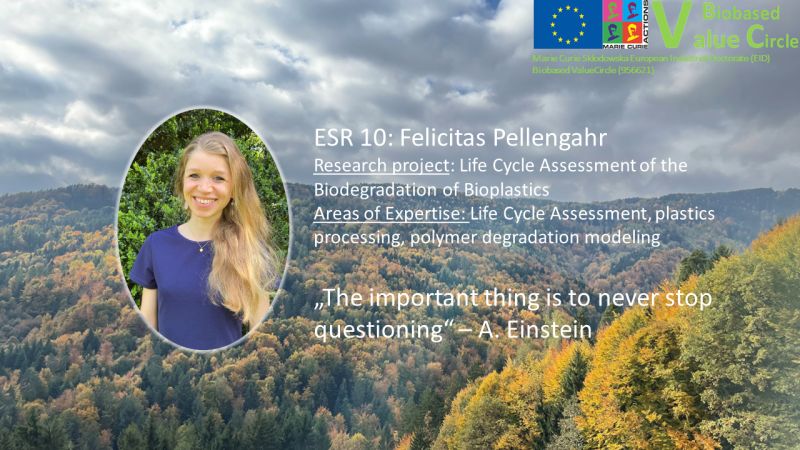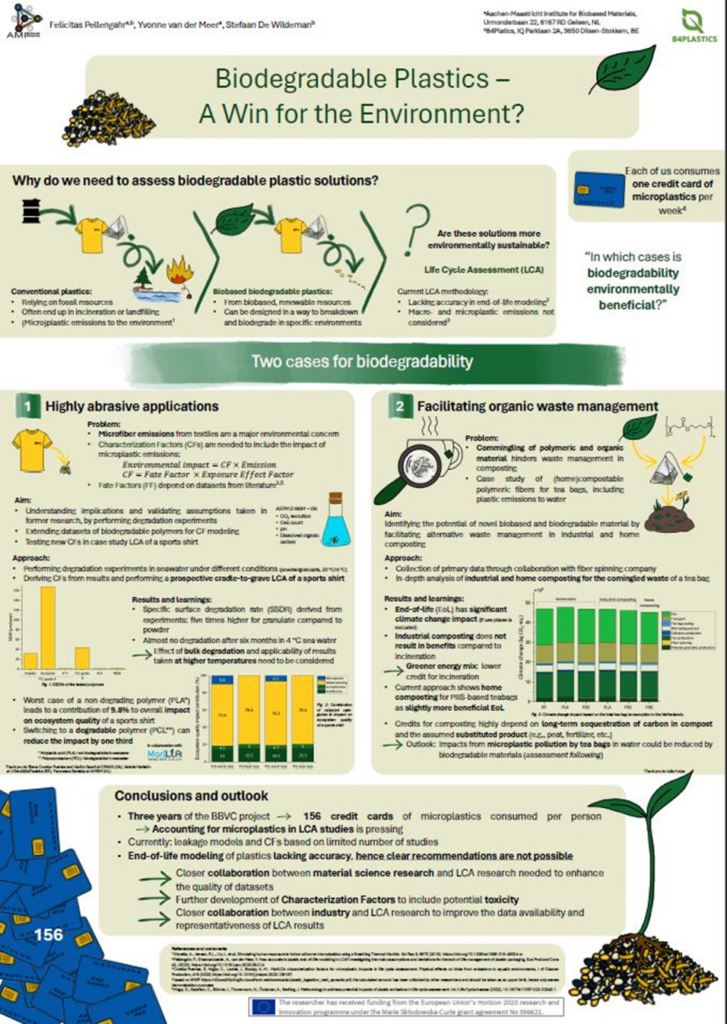
Abstract
The growing concern over plastic emissions has increased interest in biodegradable plastics and circular economy strategies as potential solutions. However, evaluating their overall sustainability remains complex. This study explores two main areas of applications: highly abrasive use cases in textiles and facilitating organic waste treatment with compostable plastics. The research was based on examining three case studies. Integrating microplastic emissions into Life Cycle Assessments (LCAs) emerges as a critical aspect for comprehensive environmental evaluation of plastic products. The case studies focus on textiles and tea bags, showcasing the environmental implications of biodegradable polymers and circularity approaches. Current findings suggest that while these materials offer some benefits, their overall environmental impact reduction is limited. Comprehensive data and advanced modeling of Fate Factors are identified as crucial for accurately assessing their environmental performance. This research underscores the necessity for integrated approaches that consider not only production but also use phases and end-of-life scenarios. Future advancements in biodegradable polymer research must prioritize robust data collection and transparent modeling techniques to refine our understanding and optimize their environmental benefits. By addressing these challenges, stakeholders can effectively navigate the complexities of holistic plastic product design and advance sustainable practices in diverse industrial sectors.
Publications for Communication and Dissemination
| Publication topic/title | Type of publication | Status |
| Review: End-of-life modeling of post-consumer plastic packaging in Life Cycle Assessments | Journal article | Published |
| Fate factor modeling for biodegradable plastics and incorporation in Life Cycle Assessment of a sports shirt | Journal article | In preparation |
| Holistic Life Cycle Assessment of a home-compostable tea bag | Journal article | In preparation |
| Life Cycle Assessment of a circular cycling jersey | Journal article | In preparation |
| Action | Target actors/audience | Means | Timing |
| Training events Biobased Value Circle #3 in Netherlands | Other ESRs and supervisors within the consortium | Presenting | May, 2022 |
| Training events Biobased Value Circle #4 in Cologne | Other ESRs and supervisors within the consortium | Presenting | November, 2022 |
| Training events Biobased Value Circle #5 in Graz | Other ESRs and supervisors within the consortium | Presenting | May, 2023 |
| LinkedIn Biobased Value Circle | Academic/Industry and general public; wide range of professionals | Promotion | tbd |
| Greener Manufacturing Show (DE) | Bioplastics industrial stakeholders | Company representation | November, 2022 |
| K-fair (DE) | (Bio)Plastics industrial stakeholders | Company representation | October, 2022 |
| Renewable Materials Conference (DE) | Bioplastics industrial and academic audience | Poster presenting | May, 2022 |
| International Symposium on Plastics Technology (DE) | Plastics processing industrial and academic audience | Presenting | September, 2022 |
| Chemistry as Innovating Science conference (NL) | Scientific audience mostly with chemistry background | Poster presenting | September, 2022 |
| 3rd International conference on a Circular Economy for Textiles & Plastics (BE) | Textile industry and academic researchers | Poster presenting | November, 2022 |
| European Bioplastics Conference (DE) | Bioplastics industry stakeholders | Poster presenting | December, 2022 |
| World Chemistry Congress (NL) | Chemistry researchers | Presentation | August, 2023 |
| SETAC Europe conference (ES) | LCA researchers, ecotoxicology researchers | Presentation | May 2024 |
| Final Symposium of the BBVC (NL) | Participants of the final symposium, specifically industrial stakeholders of polymer producing companies | Pitch presentation | May 2024 |
Protection of the acquired intellectual property (patents applications) etc.
Within this research project, the aim is to use as much of open access data and software as possible to promote more transparency in LCA research. This means that probably no IP protection will be required. However, the results could lead to tools or best practices to be used by companies in the future.
Impact on science and/or technology
To ensure a sustainable transition from a mostly fossil-based linear economy to a less fossil-dependent circular economy, potential burden shifting needs to be prevented. Therefore, it is important to assess the environmental performance as close to reality or potential future scenarios as possible. Independent LCA research and its ongoing improvement will provide guidance for research in material science, chemistry, etc. By applying LCA studies early in the development of new polymeric materials, researchers have the opportunity to steer their projects toward more sustainable outcomes. Furthermore, the contribution to the development of fate factors for the LCA methodology will provide other LCA researchers with a larger database and the necessary information to also include the impact of plastic emissions in their projects, as these are currently missing in the models/results.
Impact on innovation (companies)
Companies are increasingly under pressure to prove their efforts towards more environmentally sustainable practices. This also applies to B2B businesses where the ecological footprint of the potential product is a key characteristic besides the performance of the material. Especially companies providing novel biobased and potentially biodegradable polymers need to showcase the environmental benefits of their products. More close-to-reality modeling in LCAs will therefore leverage innovative approaches whilst providing the tools to prevent greenwashing. Especially by incorporating plastic emission impacts in LCA studies, those companies can explore the benefit of biodegradable plastic solutions. Furthermore, collaborations between companies and LCA research could be enhanced by facilitating the data flow that is necessary to increase the accuracy of LCA models.
Impact on society
Contributing to closing the gaps in end-of-life modeling in LCAs for plastics aims to lead to more realistic LCA results. Since legislative bodies rely on those as guidance for decision-making, this research could foster environmentally beneficial legislative measures. By incorporating plastic emissions and their impact on the environment, consumers of plastic products could be provided with a more holistic picture of the real effects of their purchasing choice. The outcomes of this research could also be used to educate consumers about the environmental sustainability of the different waste disposal options. Furthermore, in Denmark LCAs results are required if companies are making environmental claims. Here, a higher real-world representativeness of LCAs could also be beneficial to consumers by supporting the reliability of those studies.
Visual Summary – Poster

